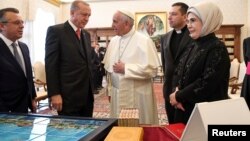Tayyip Erdogan made the first visit by a Turkish president to see the pope in the Vatican in 59 years on Monday as Rome was put under heavy security measures for fear of violent demonstrations.
Erdogan said before he left Turkey that he would discuss the Middle East situation and Jerusalem in particular. The Vatican was due to issue a statement about the meeting later.
Both Erdogan and Pope Francis are opposed to U.S. President Donald Trump's decision to recognize Jerusalem as the capital of Israel, which many U.S. allies say could doom Middle East peace efforts.
Erdogan, returning a visit made by the pope to Turkey in 2014, spoke privately with Francis for about 50 minutes in the pontiff's frescoed study in the Vatican's Apostolic Palace, which he uses mostly for ceremonial purposes.
At the end of the private part of the meeting, the pope gave Erdogan a bronze medallion showing an angel embracing the northern and southern hemispheres while overcoming the opposition of a dragon.
"This is the angel of peace who strangles the demon of war," the pope told Erdogan as he gave him the medallion, made by the Italian artist Guido Verol. "[It is] a symbol of a world based on peace an justice."
The public part of the meeting, with reporters and Erdogan's entourage, was cordial, although both men seemed stiff at the start while seated at the pope's desk before journalists were ushered out.
Erdogan's motorcade entered a virtually deserted St. Peter's Square after the streets that are usually bustling with tourists were closed due to security fears.
A small, authorized demonstration of Kurds and their supporters was held outside nearby Castel Sant'Angelo, a fortress on the banks of the River Tiber.
Some 3,500 police and security forces were on duty in Rome and authorities declared a no-go area for unauthorized demonstrations that included the Vatican, Erdogan's hotel and Italian palaces where he is meeting the president and prime minister.
Matteo Salvini, head of Italy's anti-immigrant Northern League, said in a tweet that it was "shameful" that the government was receiving Erdogan, calling him "the head of a bloody, freedom-killing Islamic regime."
Erdogan and the pope spoke by phone in December after Trump made his announcement on Jerusalem and agreed that any change to the city's status quo should be avoided.
The Vatican backs a two-state solution to the Palestinian-Israeli conflict, with both sides agreeing on the status of Jerusalem — home to sites holy to the Muslim, Jewish and Christian religions — as part of the peace process.
Palestinians want East Jerusalem as the capital of a future independent state, whereas Israel has declared the whole city to be its "united and eternal" capital.
Among Erdogan's delegation was the Mehmet Pacaci, Turkey's ambassador to the Vatican. Erdogan recalled Pacaci to Turkey in 2015 when Francis became the head of the Roman Catholic Church and called the 1915 killing of as many as 1.5 million Armenians "genocide" - something Turkey has always denied.
The ambassador stayed away for nearly 10 months.








